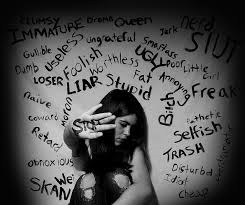It's pitch black and I hear a woman's frail voice pierce through the darkness. "I'm too tired to run. Too exhausted to scream," she weeps. "If this is the only way to escape from him -- then just kill me! Set me free! Do it. Do it. Do it. Do it!"
"Good job, Em," I say to the actress playing me as I signal to Will, my composer and collaborator, to stop playing the piano. "Could you please make it less like you're giving up and more like you're begging him to kill you?" My tone is sober, clinical even.
Our actress takes note and expertly makes her adjustment. I look at Will and he nods.
"Perfect," I tell her. "Let's move on."
For the past two years, I have watched the most excruciating and humiliating moments of my life played out in front of an audience as Will and I have workshopped "The Gingerbread Pimp," a musical based on my abusive marriage. I began writing the show six months after I left my husband -- when I had no idea that I was even in a domestic abuse situation.
Emotional abuse is becoming an epidemic in our country and experts say it can be even more harmful than physical abuse. It's the perfect crime. It leaves no visible bruises, but the scars are much deeper. Ask any victim of domestic abuse and she'll probably tell you that she'd take a punch any day over the emotional violence. Victims don't usually talk about it because they've been brainwashed into believing they are crazy. And there are no repercussions for the abuser because it is not technically against the law (yet).
Presenting my story in front of test audiences was a bit shocking at first. I would sit at the back of the house and hear the audience gasp, shriek, cry and many times talk back to the actors. Mental health professionals who saw the show would comment that though I was never actually hit, I was married to a predator and in a highly abusive marriage. Women would come up to me after the performance or find me online and tell me their own terrible stories of emotional abuse. They said they were afraid to talk about it because they were ashamed and wish they had been hit as that might have made them understand that this was abuse and they needed to leave.
Will and I started to realize that this went way beyond writing to entertain people. I started researching emotional abuse, talking to therapists and volunteering for domestic abuse organizations. I've received calls and emails from people in abusive situations who asked for my help, simply because they didn't know who else to call.
There was definitely a common theme to the stories I've heard. All of them start off very lovingly and then these six things begin to happen slowly over time (this happens to both men and women, but for our purposes, we'll say "he."):
1. "I Will Teach You." He lovingly says this under the guise of "helping" you. It starts off small, but happens more and more over time. Eventually, he questions your judgment to the point that you yourself start to question it. He makes every small decision you make seem like life or death and you make it just as important because he seems to. Over time, you become dependent on him to make every move.
2. "You Remembered it Wrong." He disorients you. You may make plans and then when the time comes, he doesn't show up and tells you that you remembered it wrong. This continues to happen and snowball until it seems you're forgetting everything. You are so confused that of course you excuse him for yelling at you. You believe it's your fault.
3. "You're Crazy." He makes you think you're psychologically unbalanced and that he needs to help you. So he controls everything you do -- the clothes you wear, the things you say, the people you talk to, and eventually, your finances.
4. "It's Us Against the World." He isolates you from your friends, family, or anyone else who you might talk to - saying that they are toxic. Really, it's because he doesn't you to listen to any of their advice since they'll probably tell you to leave him.
5. "You Do That To Me." He may never actually hit you, but he gets mad and breaks things. He physically intimidates you by punching a window or a wall near you. So it's always at the back of your mind that you're next. But at the front of your mind, you think, "Oh my God, he doesn't act like this with anyone else. I must have done this to him."
6. "You'd Be Nowhere Without Me." You are manipulated into doing things that go against your morals and you are so brainwashed and terrified, you do them without a second thought.
So once your self-esteem is non-existent, you are paranoid that people everyone's watching and judging your every move, you have no access to money, and no one to call because you've been isolated for so long...how are you going to get out? And even if you do get out, you will constantly question if all of that really happened.
I know what it's like to be dead inside - walking around like a zombie. I do not feel bad for myself. Been there, done that, wrote a musical about it. I was so lucky to have realized I needed to make a change and had a means of getting out - so many people don't and my heart is broken for them.
I'm not a doctor, therapist, or counselor. Just a musical theatre writer who has been through it and is telling my story in an effort to make people aware of the signs. Because I never want to have to write this kind of musical about you.

